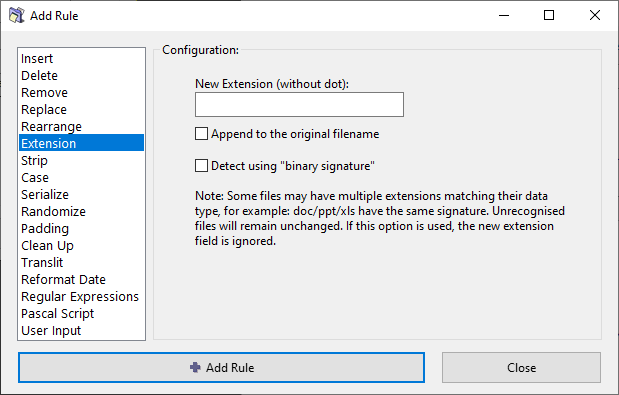ReNamer:Rules:Extension: Difference between revisions
No edit summary |
No edit summary |
||
| Line 5: | Line 5: | ||
Sometimes a file has a wrong extension. In other cases the extension is missing altogether. | Sometimes a file has a wrong extension. In other cases the extension is missing altogether. | ||
This rule allows you to | This rule allows you to attach a new extension in such cases. | ||
The parameters are as follows: | The parameters are as follows: | ||
Revision as of 04:33, 23 June 2009
Extension Rule

Sometimes a file has a wrong extension. In other cases the extension is missing altogether. This rule allows you to attach a new extension in such cases.
The parameters are as follows:
| Parameter | Details |
|---|---|
| New extension | Simply adds the new extension to the file name.
|
| Append to the original filename | If this option is deselected, the new extension will replace the old extension. (This can be used if the file has a wrong extension, for example.)
If the option is selected, the new extension is just added (This can be used when the file does not have any extension at all). |
| Detect using binary signature | Sometimes the extension of a file is missing. At other times it is wrong (e.g. some downloaded files get the aspx extension, although they may be zip or pdf.)
One way to identify the file extension is by trial-and-error: Attach different extensions and try to open the file with its associated application. This is very tedious. A far more efficient way is to compare the file's digital signature with the signatures of known file types and identify the file's type. This is done internally within ReNamer, so you do not have to know what a "digital signature" means, or the actual value of the signature for the given file. Note that several extensions have overlapping digital signatures. Thus, once a digital signature is calculated for a file, ReNamer has to guess its extension. But compared to the trial-and-error method, we have to deal with far fewer extensions here. For better results, use ReNamer with TrID, a specialized utility for identifying the file's real extension. |